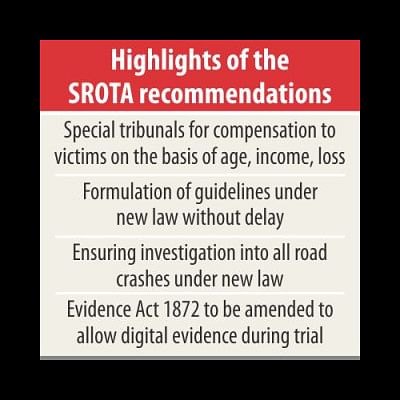Monitoring, enforcement of law key to road safety

While a new law is necessary, its enforcement, monitoring of transport management and freeing the sector from political influence are the key to safe roads, experts and activists said yesterday.
An alliance of them, Safe Road and Transport Alliance (SROTA) placed a set of recommendations that it wants to see reflected in the draft of a new transport act for “responsible and people-friendly road governance in Bangladesh”. The Road Transport (draft) Act 2018 is likely to be placed before the cabinet today.
At a press conference at Dhaka Reporters Unity, the alliance presented its suggestions it had conveyed to the authorities six months ago.
The title of the act itself should send a message to its stakeholders, which was why SROTA suggested changing it to Road Transport and Road Safety Act. The law should also mention why it is needed in its preamble, but it was missing in the draft, said Hossain Zillur Rahman, former adviser to caretaker government and convener of SROTA.
The government has fast-tracked the new transport law, as students' protests raged following July 29 deaths of two college-goers in a road crash on Airport Road.
The law should clearly set how to examine drivers' eligibility for providing licences, investigation procedure of road crashes to ensure justice and a mechanism to ensure that victims get proper compensations without any hassle, speakers said at the programme.
Some of these provisions were there in the Motor Vehicle Ordinance 1983 but were dropped while preparing the draft law. “We have to see that we are not going back 30 years” while reforming the transport sector, said barrister Sara Hossain.
Talking about elements crippling the sector, Zillur Rahman cited political influence on Regional Transport Committee that issues route permits.
Referring to lawmakers leading transport owners' and workers' associations, he said the transport sector had to be freed from political clutch if the authorities intended to establish good governance.
The law should also define code of conducts of all stakeholders -- owners, workers, passengers, and even pedestrians -- and lay out rules to be followed by both motorised and non-motorised vehicles on roads.
The draft law targeted only drivers for punishing for rule breaking and fatalities, said Ilias Kanchan, chairperson of Nirapad Sarak Chai movement.
“Whoever guilty [of a road crash] should be brought to justice,” he added.
According to the draft law, drivers should have education up to eighth grade while helpers fifth grade, leaving scope for corrupt means. Illias said, “As we see helpers aim to become drivers with time, the required education qualification should be same for both drivers and helpers."
Coordination among ministries has to be there to put in place a mechanism to provide healthcare to victims of road crashes, compensations to them, to stop child labour in the transport sector.
Apart from all these, Mozammel Hoque Chowdhury, secretary general of Bangladesh Passengers' Welfare Association, said passengers' representatives should be kept in the loop of the decision-making processes so that their safety issues get prioritised.
The government should also consider giving licence, route permits and renewal authority to the private sector, he said, “If vehicles without route permits are to be kept from roads, and drivers without licences are to be kept from driving.”
Bangladesh Road Transport Authority (BRTA) has only 250 motor inspectors, Mozammel said, adding “It would be an impossible task for them if they were to even keep count of the vehicles.”

 For all latest news, follow The Daily Star's Google News channel.
For all latest news, follow The Daily Star's Google News channel. 



Comments